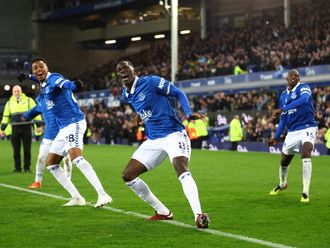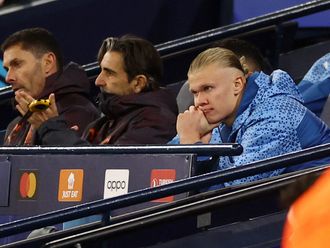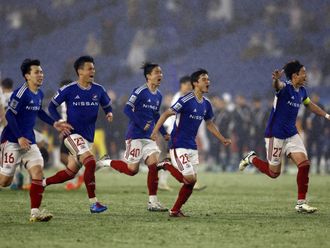Dubai: Both Manchester City goalkeeper Joe Hart and Celtic’s Craig Gordon were dropped by their clubs recently for their supposed inability to play with the ball at their feet.
Hart has been sent on loan to Italy’s Torino until the end of the season after being replaced by Barcelona’s Claudio Bravo, while Gordon’s No.1 spot has gone to Nottingham Forest’s Dorus de Vries.
There was a time when keepers were judged purely on their ability to stop shots and collect crosses, but since a rule change in 1992 prevented keepers from picking the ball up from a back pass, expectations have changed.
This, along with the rise of counter-attacking football, has seen a demand on keepers to come out of their area and fulfil the role of a deep sitting central defender or ‘sweeper’ - capable of more composure on the ball and precision in their tackling and passing.
“To put it in very black and white terms, you used to be a goalkeeper because you weren’t good enough to play outfield. Now you need to play some football,” said Dutch keeper Jasper Cillessen, who has just replaced Bravo at Barca.
For managers like City’s Pep Guardiola and Celtic’s Brendan Rodgers who like their sides to keep possession, and press with a high defensive line, while starting their attacks from the back, the role of the sweeper-keeper is vital.
But it’s actually nothing new. Hungary’s Magic Magyars of the 1950s built the foundations of Total Football, which the Dutch made famous in the 1970s. Guardiola’s Tika-Taka is just a derivative of that style, which stems from his time having played under Dutch coaches at Barcelona.
Both styles of football depend on the ability of players to switch positions with their teammates to maintain a constant passing fluid motion, oppressing, confusing and tiring their opponent, while never losing possession.
And it’s from Total Football that the sweeper-keeper was born.
Former Hungary keeper Gyula Grosics, who is credited with pioneering the role in the 1950s, said: “The attacking game-plan provided more opportunities for the opposition to counter-attack when they got possession.
“There was space behind our defence to be exploited and I had to act as a kind of extra sweeper, outside my area, trying to reach the through ball before opponents.”
It took a while to catch on but in 1974 Dutch coach Rinus Michels dropped renowned shot-stopper Jan van Beveren for Jan Jongbloed because the latter was better at coming out of his box with the ball at his feet - and so the legend of the sweeper-keeper lived on.
Michels went on to manage Barcelona, as did his compatriots Johan Cruyff and Louis Van Gaal, and from under the latter two emerged a young 10-year-old keeper called Victor Valdes in 1992, with whom Guardiola would later win two Uefa Champions League titles and three straight La Liga crowns between 2008 and 2012.
Van Gaal moved to Bayern Munich and just as he left in 2011 a 25-year-old keeper called Manuel Neuer joined from Schalke, who would later win three straight Bundesliga titles under Guardiola at Bayern from 2013 to 2016.
Both Valdes and Neuer championed the sweeper-keeper role, and when Neuer - who is currently regarded as the world’s best keeper - won the World Cup with Germany in 2014, Die Mannschaft overtook 1950s Hungary as the greatest national team of all-time, according to the Elo rating system.
That took the story of the sweeper-keeper full circle from Grosics to Neuer and underlined the position’s success. Hence why Guardiola is now trying to re-implement it at City.
If maintaining possession is so key to Guardiola’s style of play, having Hart just lump the ball forward isn’t going to work and that’s why he’s been axed.
Over the past three seasons Hart has played 75 per cent of his balls long and had a meagre pass completion rate of just 49 per cent. But if you look at Neuer’s stats over the same period he played 34 per cent of his balls long with an 85 per cent pass completion rate.
Getting a keeper closer in style to Neuer was the priority for Guardiola, but there are still those who see it as unfair on Hart.
“In Spain or Germany attackers don’t rush you as much so you have more time, but English crowds want people rushed and Joe liked to show how far he could hit it,” said former Man City keeper John Burridge.
“What he’s being asked to do isn’t that hard. Instead of hoofing it just take possession, allow the two centre halves to split and the fullbacks to go forward and either put it wide to the centres or knock it over the top for the fullbacks to run onto.
“In the back third it’s usually three defenders against one attacker, so it’s very easy. All Neuer does is receive the ball and gives it to a spare man. He has acres of space. If there’s an ounce of danger then just hit it. It’s common sense.
“What you essentially become is a fulcrum and instead of defenders playing risky long balls square across the back, you play it through the keeper. Everyone is saying that it is revolutionary but it’s not. We’ve been training like that for years.”
Former Celtic defender Derek Whyte agreed: “It’s nice to know that your keeper is comfortable with the ball at their feet and it’s good because this style of play gives you an extra man. But a keeper’s priority is to stop the ball with their hands.
“Joe could have worked on his feet and improved. Any player can always work on any aspect of their game, and I’m sure Joe was up for doing that, but Pep wasn’t having it. I think it’s extremely harsh as Joe’s a good keeper.”
Burridge added: “I think Pep’s looked at Joe’s performance at the Euros and thought ‘he’s had a nightmare, I don’t want this keeper in my team. He’s not as good as he thinks he is.’
“I also don’t think Pep likes him as a person. Joe’s been there 10 years and thinks he’s king of the club. You also see him in the tunnel using industrial language to spur the team on before a game and I don’t think Pep likes that.
“Pep has always preferred humble characters in the dressing room and Joe’s not humble. So Pep has come in and thought ‘I’m the boss, and I’m getting this kid out’, the sweeper-keeper thing is just an excuse.”
Either way it will be interesting to see if Hart evolves on the continent, or whether Guardiola’s risky penchant for keepers coming out backfires due to the comparitive lack of time players have on the ball in England. And if Bravo’s basic shot-stopping skills don’t live up to Hart’s there will be serious questions.










